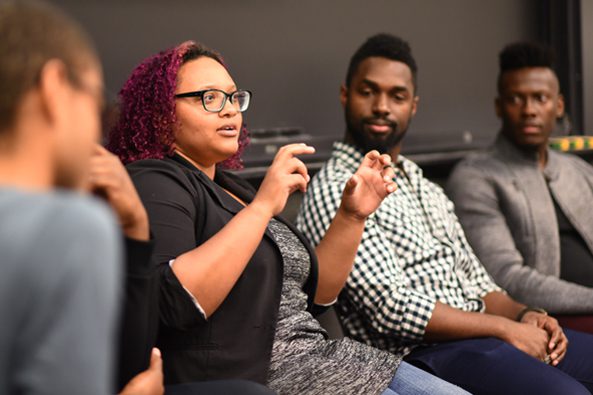Friday News Roundup – Northwestern Introduces New Classes, and More

Let’s take a look at some of the biggest stories from this week, including new Northwestern classes for its MBA program.
NYU Stern Faculty to Share Expertise on Artificial Intelligence – NYU Stern News and Events
NYU Stern School of Business has announced that select faculty members will be available for speaking engagements, panel discussions or other knowledge sharing on the state of one of tech and business’ greatest forces: artificial intelligence.
According to a recent announcement, leaders in their various fields will be available for comment in articles, or for speaking engagements and discussions on AIs present and future. Information Systems Professor Vasant Dhar, an expert on machine learning in finance, has explored the question of how reliable AI is in the handling of personal finances, as well as AI in big data, healthcare, and education.
Professor of Economics Nicholas Economides, which seems a little too on the nose for an economic’s professors name, is available to share his knowledge on the inequality that tech culture can perpetuate, particularly in California’s IT sector. His research focuses upon how public policy accommodates changes in technology, and how the ebbs and flows of the tech sector affect workers disproportionately to owners and shareholders.
Other topics on which faculty members will contribute their expertise are the ethical concerns behind the use of AI; the possibilities behind AI and crowdsourcing; the legacies of certain innovators throughout history, and a look at how workforce policy has addressed the shifts of the sharing economy.
For more on potential faculty engagements on the topic, read here.
UC Davis Graduate School of Management Professor Weighs in on Stock Buybacks – Yahoo! Finance
University of California, Davis Graduate School of Management professor Paul Griffin recently weighed in on corporate stock buybacks for Yahoo Finance.
A recent op-ed piece for the New York Times by Senator Chuck Schumer and Bernie Sanders criticized the practice for its marginalization of citizen stock traders in favor of corporations by increasing the value of shareholders’ stock options. In certain situations, however, buybacks have an unfavorable effect on stock prices.
Historically, during buybacks for large corporations such as Xerox and General Electric, stock devaluation has been the unfortunate end result. UC Davis’ Griffin notes, “The initial response generally positive, [shares] get a little bump in price. Then people start thinking more about what’s going on here, how a firm is performing on an economic basis rather than managed number basis.”

Few company’s damaged itself through stock buybacks more than General Electric, which bought $40 billion of its own stock (15 percent of its entire market) share. In 2016, the company’s individual stock price was valued above $30, but now consistently is sold between $7-10 per share.
Among the other companies that have landed in Yahoo! Finance‘s “Hall of Shame” are Viacom, GM, IBM, General Electric, and Sears.
Read here for more on corporate stock buybacks.
New Courses at Kellogg Will Focus on Shifts in Global Business – Northwestern Kellogg News & Events
Northwestern University’s Kellogg School of Management has announced 12 new courses that will explore the evolution of global business trends.
“To address the ever-evolving professional development needs of our students, it is a top priority to continually innovate our MBA curriculum … We’ve incorporated a mix of experiential learning, diverse intellectual perspectives and emerging business topics in our latest course offerings.” says Michael Mazzeo, Senior Associate Dean of Curriculum and Teaching.
Among the new course offerings are Blockchain Technology, Digital Assets and the Future of Finance, Corporate Entrepreneurship: Organization Design for Disruption, Leadership Ethics and Empathy, and The Right Stuff: Principles Behind Successful Careers.
Kellogg’s Curriculum Committee, which is comprised of seven faculty members from each of the school’s department, reviewed and approved the new courses via a detailed process that ensures the relevance and breadth of the coursework. To learn more about the new courses, read here.
Habitat for Humanity CEO Speaks at Fox on the Challenges of Non-Profit Fundraising – Fox School of Business News
Temple University’s Fox School of Business‘ Board of Fellows recently gave a presentation on issues pertaining to non-profit fundraising for an audience of MBA students.
Featured guest speaker Christine O’Connell, CEO of Habitat for Humanity, presented the challenges inherent in raising money for non-profit entities learned from her over twenty years of experience. “There is never enough money,” O’Connell says, “and there is entirely too much need. To put that need into context, 800 people call us a month. We are [only] building twelve houses a year and repairing 100.”
O’Connell focused upon the importance of maintaining strong relationships with donors, and of treating each donor with equal respect. Six figure donations, she believes, should be received with the same level of gratitude as smaller amounts. ““You gotta make a connection with people,” O’Connell says, “… You gotta create empathy, and you have to have people feel and know that they are empowered and that their gift counts.”
“[O’Connell] presents Habitat in such a way where she hones it down and says this is how you can help, by supporting this organization and talking about the breadth and depth of what they do, not just that they do it,” said Ellen Marshall, an advisor for Fox Management Consulting and Strategic Clarity Advisors and longtime fundraiser for non-profits.
Read more on O’Connell’s talk here.
Credit Card Company for Emerging Markets Wins Sloan’s Startup Competition – MIT Sloan News
A credit card company for emerging markets won this year’s “MIT Sloan Accelerate 100K Entrepreneurship Competition.”
The company, Duo, is aiming to help the millions of small and mid-sized Latin American businesses that lack credit. In Mexico, businesses that are less than two years old are not granted credit, which lands many of them in massive amounts of debt.

Duo co-founder Hugo Lopez-Velarde, (MBA ’20), winner of this year’s “MIT Sloan Accelerate 100K Entrepreneurship Competition.”
Duo co-founder Hugo Lopez-Velarde, (MBA ’20) says, “In Mexico, corporate cards are uncommon—often, business owners use personal cards and take on credit on behalf of their businesses … This is the first step for next-generation financial products for companies in Mexico.”
Duo users will not only be free of personal debt, but they will also establish credit history. Duo’s card also boasts an analytics dashboard that will allow business owners to manage spending.
Runners-up focused upon emerging technologies in healthcare. The startup Encora created a therapeutic wearable wristband that alleviates hand tremors in neurodegenerative patients. Hikma Health designed customized data systems for healthcare providers who are treating the Syrian refugee population.
Accelerate 100K’s winner and runners up were chosen based upon audience votes, and will advance to Sloan’s Launch competition this spring. Read more about Accelerate’s winners and about Launch here.
Revolutions in Big Data, Housing, and More – Boston News

Let’s explore some of the most interesting stories that have emerged from Boston business schools this week.
So Much For The Robocalypse – Everett
BU Questrom School of Business Richard C. Shipley Professor in Management Iain M. Cockburn, an expert in innovation, was recently interviewed by the business school’s magazine, Everett, about his new paper “The Impact of Artificial Intelligence on Innovation.” His research, written alongside members of Harvard and MIT and published in the National Bureau of Economic Research, explores the long-standing potential of artificial intelligence, which can become a more all-purpose technology, rather than a niche concept or simply a tool to replace every degree of human labor.
Cockburn argues that AI, if used wisely, can replace the menial tasks associated with white collar employment, such as legal services.
“What a lot of people are sitting up and noticing is that this form of automation or replacement of human work with a computer is now percolating into areas that have been largely unaffected by previous technological revolutions,” he says. “Take legal services. It turns out that by using this technology, you can create systems that will do a lot of low-level legal work, like scanning contracts, reviewing contracts, or reviewing documents.”
A pessimistic view could say developments like this could lead to job loss, which may be true. However, in the evolution of the modern job environment, flushing out repetitive tasks that do not require critical or imaginative thinking could allow people to focus on larger issues, rather than bogging down daily routines.
“Then there’s a second question: ‘If I didn’t have to spend so much of my day doing that, what could I be doing that involves imagination, insight, critical thinking?’ So, for some people, their jobs are going to get much more interesting.”
You can read more from the Everett interview of Cockburn here, and check out the “The Impact of Artificial Intelligence on Innovation.”
Could Big Data Replace the Creative Director at the Gap? – Harvard Business Review
Assistant Professor Ayelet Israeli, “an expert in channel management, pricing, online marketing, and eCommerce” took to HBS’s Cold Call Podcast to discuss Gap CEO Art Peck’s move to eliminate its creative director and “turn to big data to predict what the big next designs are going to be.”
Since Gap is now identified as a basics brand, Israeli explains that “maybe it’s okay to sell the trend that everyone else is selling. If you’re selling something that is more fashion forward, then you’re in a bigger problem because you need someone to create this new trend and not just spot the trend that everyone else is doing.”
“The other part of [Peck’s big data] strategy is essentially to shorten production cycles that they had at the Gap. They were from traditional companies that take about 10 months, almost a year, from when they decide on something and it reaches stores. Now they shortened it to about eight to 10 weeks for most of their product categories.”
You can find the full HBS article here.
Corcoran Center to Debut Housing Case Competition – Boston College News
BC Carroll’s Corcoran Center for Real Estate and Urban Action announced a new case competition and panel discussion moderated by Boston Capital Vice President and Director of Communications David Gasson entitled, “The Future of Housing.”
The competition is “intended to hone students’ analytical skills in the field, raise awareness about issues connected to affordable housing development, and offer an in-depth look at the Low-Income Housing Tax Credit as a tool that helps both communities and developers of affordable housing.”
Corcoran Center Executive Director Neil McCullagh writes, “This competition will be a way for students to understand that housing challenges are deeply connected to every facet of our lives. It will also provide them great vision into an industry where they can do well while doing good.”
“In the competition, students will be analyzing a real housing deal. They will need to present their best understanding of the policy and their analysis of the deal outlined in the case. They will then present their solution and recommendations to the judges. The best team will walk away with the grand prize.”
Read more about the “Future of Housing” case competition here and the full Boston College News article here.
DeGroote Professor Workplace Policy Helps Shape New Law, and More -Toronto News

This week, Toronto business schools discuss substantial contributions to the workplace, researchers from DeGroote and Ryerson have each worked to make workplaces more just and equitable, and a new book by Rotman professors gives practical tools for incorporating AI into business.
Doing Right By Employees Ultimately Pays Off – McMaster Brighter World
Research from Isik Zeytinoglu, professor of human resources and management at McMaster University’s DeGroote School of Business, has shown that treating employees well may be a shrewd move for employers. Dr. Zeytinoglu, whose research influenced the World Health Organization’s WHO Healthy Workplace Framework, has been touting the benefits of a healthy relationship between employers and workers for over 30 years. The Fair Workplaces, Better Jobs Act, which came into effect at the beginning of April, had many benefits and protections for workers, including a requirement that part-time and temp employees must receive the same pay as full-time staff for the same work.
“In the long term, equity helps society, the community, and the economy,” Zeytinoglu said. “Throughout history, there have been employers who considered fairness and behaved justly toward their workers, and they are the ones who have prospered.” It is no coincidence that the new law aligns with much of Zeytinoglu’s research; in fact, the government consulted the professor during the bill’s formative stages.
Read more about the new bill and Zeytinoglu’s work here.
These Are the Workplace Gender Equity Tactics That Actually Work – Canadian Business
This week, professors at Ryerson University’s Ted Rogers School of Management, Martin Fabro and Chris MacDonald, wrote an article on gender equity for Canadian Business; a follow-up to one the authors wrote in late March, “A Seven-Step Plan To Improve Gender Diversity At Any Company.” While the first piece offered actionable instructions to improve gender diversity, Fabro and MacDonald focused their follow-up on which of the most popular gender diversity tactics were rooted in evidence-based practices.
The Ryerson researchers explored which gender equity practices helped to either, “actively improve gender diversity (and in particular to increase the number of women in leadership roles), and to reduce underlying gender bias and discriminatory attitudes within the organizational culture.”
Learn more about improving gender equity in the workplace here.
PREDICTION MACHINES: The Simple Economics of Artificial Intelligence – Rotman New Releases
In their new book, PREDICTION MACHINES: The Simple Economics of Artificial Intelligence, Ajay Agrawal, Joshua Gans, and Avi Goldfarb took on the task of theorizing the possible role of artificial intelligence in business. In the past, the possible effects of AI on business seemed so vast, they were difficult to tackle. Agrawal, Gans, and Goldfarb demystify AI, by re-framing it as a prediction tool.
“More than just an account of AI’s powerful capabilities, PREDICTION MACHINES shows managers how they can most effectively leverage AI, disrupting business as usual only where required, and provides businesses with a toolkit to navigate the coming wave of challenges and opportunities.”
A book launch was held at the Rotman School of Management on April 16.
You can read more about PREDICTION MACHINES here.
Harvard Talks Analytics, MIT Explores Diversity in Tech, and More – Boston News

Let’s explore some of the most interesting stories that have emerged from Boston business schools this week.
Should an Algorithm Tell You Who to Promote? – Harvard Business Review
Professor of human resource management Jeffrey T. Polzar published a fictionalized case study that illuminates the influential role that “people analytics” algorithms play in steering hiring managers to which hot new talent. In a recent interview with Harvard Business Review, Polzar said:
“The day after Anne’s farewell party, Aliyah met with Christine and Brad Bibson, a data scientist on the people analytics team. ‘We’ve just started looking at networks,” Brad said, ‘and we think they can reveal some useful information. These are network analyses based on Molly’s and Ed’s e-mail and meeting history at BBI. With their permission and without looking at the content of their e-mails or calendars, we analyzed who they had been in contact with across the firm over the past six months.'”
Explore more of the fictionalized case study here.
Diversity in Tech a “People Problem” In Need of a Management Solution – MIT Sloan Newsroom
The MIT Sloan Coders Club recently hosted the Black in Tech and Entrepreneurship panel, in which a group of five entrepreneurs and engineers “shared experiences and offered suggestions on what tech companies can do to diversify their workforces and diminish bias.” Adam Taylor, founder of news app Black, explains:
“It is a people problem. When you think about the people that are on your teams professionally, how would you hire someone to work with you every day for however long they’re with your company? You tend to hire people you’re comfortable with.”

Students Roderic Morris of Drift, Amal Hussein, Nana Essilfie-Conduah, and Adam Taylor / Photo via Mimi Phan
Read more about this diverse take on tech’s diversity issue here.
AI Knows What Customers Want, Transforms Supply Chains – D’Amore-McKim Blog
D’Amore-McKim’s distinguished professor of supply chain management Nada Sanders uses Spanish “fast fashion” company Zara as the shining example of an optimized supply chain that uses artificial intelligence to drive customer satisfaction. In fact, many other businesses have begun to crib notes.
“Seven-Eleven Japan has taken lessons from Zara, using technology to microsegment demand and to understand what customers want. They will literally reshuffle and change what the merchandising looks like in the course of one day, in one location, for different segments of customers.”
Read more about professor Sanders’ research here.
Babson Reveals New Scholarships, Rankings, for Blended Learning MBA – MetroMBA
MetroMBA recently spoke with F.W. Olin Graduate School of Business faculty director Phillip Kim about the shape of the Babson Blended Learning hybrid online MBA program, shortly after the school earned some high praise from the likes of the Financial Times.
“Our program integrates the best of the ‘full-time’ graduate experience with a delivery format designed for working professionals, whose time is at a premium. Our students can complete their MBA in 21 months while working full-time. They learn from accomplished faculty, who are experts in their own disciplines and translate academic concepts into practical takeaways for our students. We are also the number one school for entrepreneurship education, and this ethos is infused throughout the program.”
Read more of our interview with Kim here.
Marshall Online MBAs Tap into IBM Watson For Business Solutions

Online MBAs enrolled in the USC Marshall School of Business’ Opportunity Recognition and Implementation course were recently tasked with developing a startup that takes advantage of the supercomputing capabilities of IBM Watson, the tech company’s flagship artificial intelligence system.
The course, taught by Professor of Clinical Business Communication Pete Cardon and Associate Professor of Clinical Entrepreneurship Elissa Grossman, has been part of the MBA curriculum at Marshall for two years. The project, meanwhile, goes as follows: Students studied how Watson’s analytics software works, and then identified a problem they can solve with that technology. Each team then formulated a business plan that could be introduced and put into action, and pitch it to a panel of entrepreneurs and venture capitalists.
“This is not an abstract exercise,” Cardon told USC Marshall. “This is a very intense project that places students in a situation where they are thinking about how to use cutting-edge technology for new products. And we provide access to the people who are really doing this—the experts at IBM.”
Each MBA team was supported by IBM mentors and experts, such as Daryl Pereira, the Creative Content Director of Watson and Cloud Platform. Pereira told USC Marshall that IBM’s collaboration with the school and it’s Online MBAs has produced impressive results.
“We knew it would be exciting partnering with USC to explore the possibilities of artificial intelligence with the brightest business minds,” Pereira said. “What we weren’t prepared for was the creativity in the startup ideas from the students: everything from the automated review of legal contracts to the creation of a data-driven record label.”
This year’s winning was the Music Predictor, a plan drawn up by the MBA team of Steven Truong, Michele Rosette, and Erin Young. The predictor was described as “a cognitive tool that analyzed song metadata and social media to provide projections of future revenue for a potential song, allowing smaller record labels to refine their budgets.” As the winner of the pitch competition, the Music Predictor team earned an invitation to the IBM Watson Developer Conference.
“We spent a significant part of our time applying our fresh business knowledge to the various IBM technologies that were showcased,” Troung said. “We discussed feasibility of novel technology-business concepts, pondered the unmet market needs for various exhibitions and discussed real startups with more veteran entrepreneurs that are in high-growth technology spaces.”
MIT Professor Talks Disruptive Potential of Self-Driving Cars

Few modern incarnations have such a high-level of disruption than self-driving cars. MIT Sloan recently took a look at the potential impact.
Last month, the House passed the “Self Drive Act,” which establishes a “federal framework for regulating self-driving cars.” This legislation permits 25,000 self-driving cars on the road annually between now and 2020, followed by 100,000 per year after that.
Sloan professor David Keith, whose research explores emerging automotive technologies, says self-driving cars have “the potential to change the whole paradigm of vehicle ownership.”
According to Fortune, most cars are parked 95 percent of the day. Shared self-driving cars would save car-less consumers money, create less congestion on the roads, reduce commute times, and offer mobility for folks who otherwise can’t drive—“teenagers; people who are sick; those who have lost their license; and the elderly.”
As job opportunities open up for people as a direct result of self-driving cars, it’s likely the ubiquity of autonomous vehicles will put bus drivers, as well as the 3.5 million truck drivers, out of work. Keith puts an optimistic spin on the development, believing there is still a need for human involvement, “whether it is for loading and unloading freight on trucks or ensuring the safety and comfort of passengers on buses.”
The article points out that the House will impose minimal oversight on self-driving car manufacturers due to the fact that autonomous vehicles will significantly reduce the number of motor accidents, which topped 40,000 in 2016, according to the New York Times. Autopilot-activated Teslas reduced the likelihood of crashes by 40 percent, according to data.
Keith concludes, “To ensure that self-driving cars can reliably make good decisions, even in situations they’ve never before encountered, we need to get more self-driving cars on the road.
